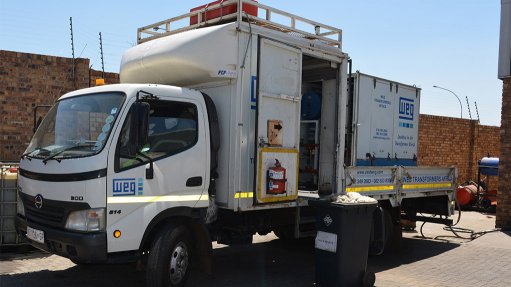
With what is claimed to be the largest mobile oil regeneration plant in Africa, WEG Transformers Africa plays a vital role in extending the life of South Africa’s transformer population and preventing unplanned downtime within electricity transmission systems.
“Ageing transformer oil introduces a number of risks into the performance and longevity of oil cooled transformers,” according to Ronaldo Bertoldi, engineering manager at WEG Transformers Africa. “Moisture and impurities reduce the intended insulating effect that oil has within the windings and produces acid, making it more likely for breakdowns to occur, with potentially severe damage to the transformer itself.”
WEG Transformers Africa (WTA) is able to conduct an oil regeneration service on-site for large transformers – those with at least 5 000 of oil in their tanks. This is done by transporting the regeneration plant by road and setting it up at the location required by the customer. Once linked up to the transformer, the unit circulates the oil through a process which involves filtering it through Fuller’s earth to remove impurities.
Careful sampling of the oil is first conducted – in accordance with ISO and SANS sampling procedures – by the company’s field teams, so that oil testing can establish the severity of the contamination. Laboratory tests, also conducted by WTA, are able to pick up the extent of cellulose breakdown from the insulation around the windings, oil decomposition and any moisture ingress.
“The regeneration process removes acids, as well as absorbing moisture and oil decaying products through a hot oil circulation process through Fullers earth and inline oil purification in a closed loop path,” Bertoldi says.
The process of purification only is shorter, and uses inline micro filters to remove water, alcohol, dissolved gasses, oxides and solid impurities. This is also a hot oil circulation process conducted in a closed loop path, and can usually be conducted in less than a day, depending on the condition of the oil.
The number of ‘passes’ that the oil requires through the system is based on the laboratory tests that indicate the level of contamination.
Most of this work is conducted for end-users of transformers in various industrial sectors, with municipalities currently doing less oil purification or regeneration than in the past.